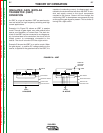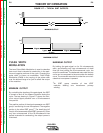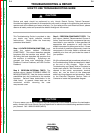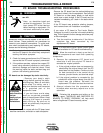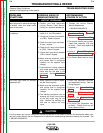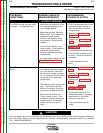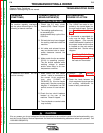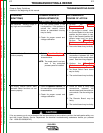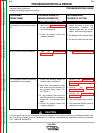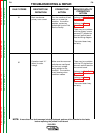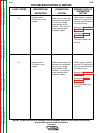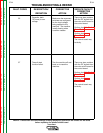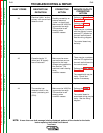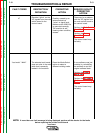
Return to Section TOC Return to Section TOC Return to Section TOC Return to Section TOC
Return to Master TOC Return to Master TOC Return to Master TOC Return to Master TOC
V350-PRO
TROUBLESHOOTING & REPAIR
F-7 F-7
Observe Safety Guidelines
TROUBLESHOOTING GUIDE
detailed in the beginning of this manual.
CAUTION
If for any reason you do not understand the test procedures or are unable to perform the test/repairs safely, con-
tact the Lincoln Electric Service Department for electrical troubleshooting assistance before you proceed.
Call 1-800-833-9353(WELD).
PROBLEMS
(SYMPTOMS)
POSSIBLE AREAS OF
MISADJUSTMENT(S)
RECOMMENDED
COURSE OF ACTION
FUNCTION PROBLEMS
The machine’s welding output is
very high and uncontrollable.
1. Put the Control Select in the
Local position. If the problem is
solved the remote control
device or associated circuitry
may be faulty.
2. Check for proper current and
voltage calibration.
1. Perform the Current
Transducer Test.
2. If the output is normal when
the Control Select is in the Local
position but the output is very
high in the Remote position the
remote board may be faulty.
Perform The SPI Cable
Resistance and Voltage Test.
3. The control board may be faulty.
The Weld Mode Select does not
function properly.
1. Refer to Operation Section of
this manual for normal operation
characteristics.
NOTE: The mode panel is not pre-
sent if the advanced
process panel is installed.
1. Check for loose or faulty plug
connections between the con-
trol board and the mode select
panel. See the wiring diagram.
2. Perform the SPI Cable
Resistance and Voltage Test.
3. The Mode Select Panel board
may be faulty.
4. The control board may be faulty.
The output control and/or Weld
Terminals Select functions do not
operate properly.
1. Refer to Operation Section of
this manual for normal operation
characteristics.
2. Check for proper current and
voltage calibration.
1. Check for loose or faulty plug
connections between the
remote board and the weld/out-
put controls. See the wiring dia-
gram.
2. The Remote Board may be
faulty.
3. The control board may be faulty.



